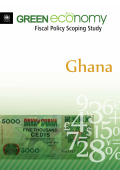For the International Labour Organization (ILO), gender equality has been the core value of its work since its founding in 1919. The pursuit for gender equality is grounded on its recognition that equality is not just an intrinsic value and a right in itself, but also instrumental in achieving economic growth and poverty reduction. This policy brief aims to contribute to the discussion on how gender equality can become an integral part of green economy strategies and how equal access for women and men to green jobs which are decent can be enhanced. The policy brief is targeted at policy makers, social partners and experts in the field working on green jobs/green economy issues.

This study attempts to contribute to the growing research on green supply chain management (GSCM) strategies by relying on the Natural Resource Based View (NRBV) and relational view. Specifically, this study investigates the role of collaborative capability in moderating the effects of GSCM practices on firm performance. Using hierarchical regression, this study analyzes data from a survey of 230 South Korean manufacturers. The results show that the implementation of GSCM practices can improve both environmental and financial performance of the firm. Also, the findings indicate that firms can expect improved financial performance when they seek a synergistic effect by involving their partners in the GSCM implementation process.
China’s economy is undergoing a major structural transformation towards a new development model focused on achieving better quality growth that is more economically and environmentally sustainable, and achieves better social outcomes for the Chinese people. This paper traces the origins and explains the content of this new growth model, and considers its likely implications for the trajectory of China’s greenhouse gas (GHG) emissions. In so doing, this report can contribute to an important policy debate concerning the future direction of China’s economy and its role in responding to global climate change.
The Green Economy Toolkit for Policymakers produced under PAGE provides countries with practical guidance on how to formulate and assess policies, measure progress and model future effects of the transition. The toolkit consists of three reports, where the guidance manual for green economy policy assessment advises governments on how to set targets, identify policy reform needs, estimate the amount of investment and assess policy impacts.
This manual provides a customized guidance on how to conduct a target-driven Green Economy Policy Assessment (GEPA) in order for policymakers to develop and adopt green economy policies to achieve their sustainable development targets. It is aimed at all those who are involved in managing, designing or implementing projects in the name of green economy (or green growth, green development, low-carbon development and the like).
